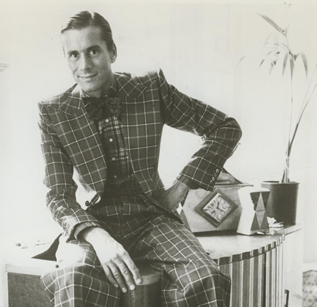Prior to recent time spent with
The Diaries of Kenneth Tynan (edited by John Lahr), I knew precisely four things about this inspiration: that he was a slightly louche but defiantly stylish dandy; that he was an outspoken critic of some legendary standing; that he'd a fine line in sadomasochism - hardly unusual in an Oxford man, I know - and that he was the first person to "F-Bomb" the BBC, albeit by way of a stammer. It probably - in an aural manner of speaking - resembled this modern internet icon of desolate, frustrated displeasure:
I cannot easily resist the outspoken, so it's an utter pleasure to read of the lacerating effect Tynan's words could inflict on all and sundry. I suspect that those who called for him to be hanged after his 1965 expletive spree on the BBC were probably comprised of fellow masochists seeking a thrill they could experience in public (so naturally, these complainants included Members of Parliament) and their better known counterparts, Daily Mail readers. And with unknowing and perfect irony, Mary Whitehouse informed the Queen in a letter that she felt Tynan deserved nothing less than a punitive spanking; he must have rung her number for days
Outspokenness and daring were two of his most immediate characteristics - these facets certainly spurred a number of things in his life, from his positioning as a high priest of filmic and theatrical criticism to his battles against censorship, his taste in plum coloured suiting, a yen for spanking and caning his sexual partners, and his staging of a nude revue. Ironically, despite his long pursuit and achievement of public note, he felt that he had created a less diverse body of work than one with his passion for the worlds created on the stage and in the studio ought to; his notoriety was achieved by his opting to be more of an onlooker than a participant. I realise that he is not as well remembered as he could be - for a myriad of factors, I'm sure - but I nevertheless think he denigrated himself a little too finely on this point - the critical world of his day gained much from his way of thinking, his almost overly keen awareness of cultural movements and his archly beautiful prose, all of which saturated his writing
Because this is
Mode Parade, I will point out that these behaviours seemed to inform his dressing. One would be maybe a little surprised to learn that not all men named Peacock live up to the sobriquet, but even if they did, I doubt many could strut with Tynan's determined pleasure in his own individuality. The Tynan of the 1940s and '50s shows something of the studied languor of the Bright Young Things he shared an alma mater with and his tastes were rooted in simple, clean tailoring, give or take an extravagant waistcoat or a gold coloured shirt. But come the Peacock Revolution and the 1970s, his wardrobe juxtaposed a classicist's awareness of his age - the sober cardigans in which he relaxed and the stately fur coat I'd like for myself - with his natural flamboyance, boasting a resplendent collection of op art-like print shirts that he was able to blend with wide neckties and suits of off white and dove grey cloth in a way only gifted individuals and master stylists are wired to do. There's a reason that such looks - when done well - are described as fun; it's a game of achieving harmony and balance, and should be approached as such. And I've always believed that such success takes a particular physical and mental refinement, which is possibly why Corin Redgrave's Tynan look has the edge on that of Rob Brydon when they played the critic in separate productions over the past decade
I think my favourite impulse of his is the daring, but mainly for puerile reasons, I admit. Such a ribald, filthy-minded adventurer, really; not just the smacking of girls' bottoms, but the very public reading of the Spanking Times on train journeys and the bloody comedy of errors that was his experience of consuming vodka rectally, having read a recommendation of it in Alan Watts's autobiography. I suspect that Tynan's biggest mistake was going out for an Indian right before having the enema tube inserted
For all of that he was a dysfunctional scamp, he was also a magnetic personality with a laudable mastery of the language and what I admire about him the most is rather simple - he was the consummate individual and nothing if not self-aware. And so, I end this in my customary manner: a round of photographs and a final word from the subject himself. That's one to grow on
All of the preceding: Tynan and his second wife Kathleen during the 1970s, seen in the last with Roman Polanski
Rob Brydon and Catherine McCormack as Kenneth and Kathleen Tynan in the BBC production, Kenneth Tynan: In Praise of Hardcore
Corin Redgrave in the Royal Shakespeare Company's one man show Tynan, adapted for the stage from Lahr's book of the diaries by Richard Nelson with Colin Chambers, in 2004
Without self-approval, there is no self-confidence, without self-confidence one has no secure identity; and without a secure identity one has no style























